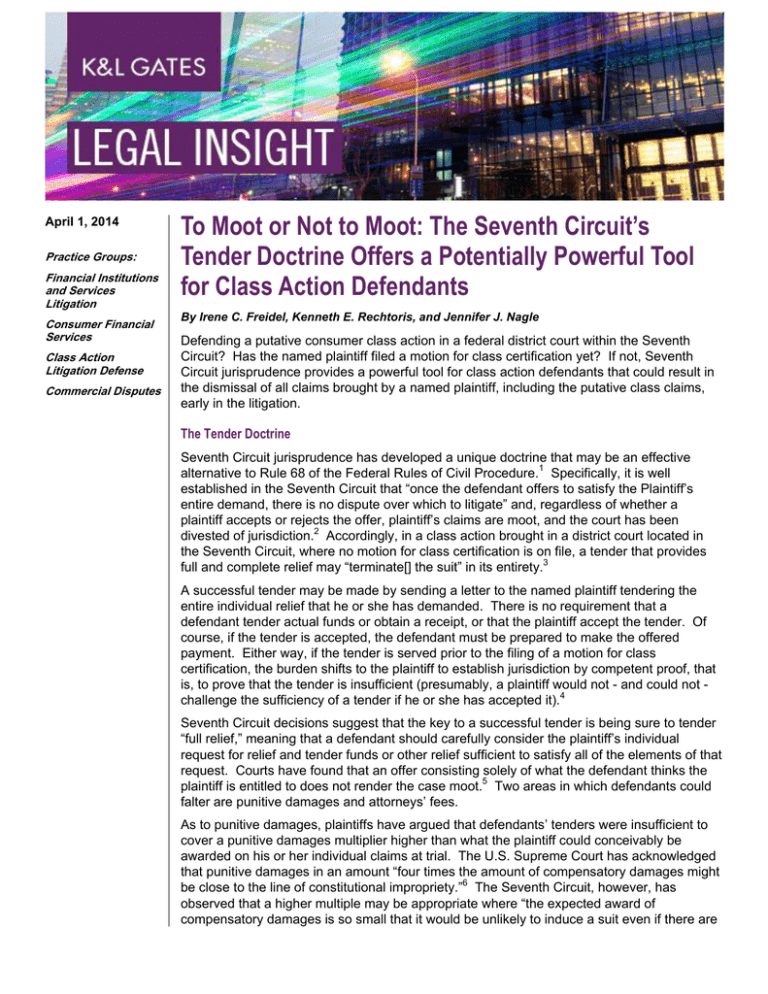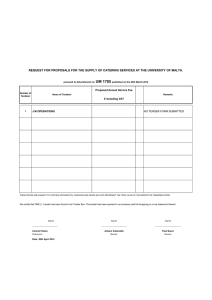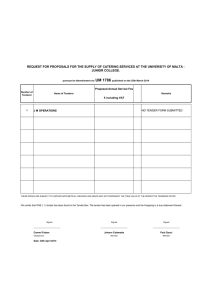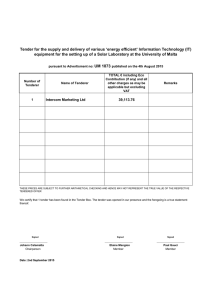
April 1, 2014
Practice Groups:
Financial Institutions
and Services
Litigation
Consumer Financial
Services
Class Action
Litigation Defense
Commercial Disputes
To Moot or Not to Moot: The Seventh Circuit’s
Tender Doctrine Offers a Potentially Powerful Tool
for Class Action Defendants
By Irene C. Freidel, Kenneth E. Rechtoris, and Jennifer J. Nagle
Defending a putative consumer class action in a federal district court within the Seventh
Circuit? Has the named plaintiff filed a motion for class certification yet? If not, Seventh
Circuit jurisprudence provides a powerful tool for class action defendants that could result in
the dismissal of all claims brought by a named plaintiff, including the putative class claims,
early in the litigation.
The Tender Doctrine
Seventh Circuit jurisprudence has developed a unique doctrine that may be an effective
alternative to Rule 68 of the Federal Rules of Civil Procedure.1 Specifically, it is well
established in the Seventh Circuit that “once the defendant offers to satisfy the Plaintiff’s
entire demand, there is no dispute over which to litigate” and, regardless of whether a
plaintiff accepts or rejects the offer, plaintiff’s claims are moot, and the court has been
divested of jurisdiction.2 Accordingly, in a class action brought in a district court located in
the Seventh Circuit, where no motion for class certification is on file, a tender that provides
full and complete relief may “terminate[] the suit” in its entirety.3
A successful tender may be made by sending a letter to the named plaintiff tendering the
entire individual relief that he or she has demanded. There is no requirement that a
defendant tender actual funds or obtain a receipt, or that the plaintiff accept the tender. Of
course, if the tender is accepted, the defendant must be prepared to make the offered
payment. Either way, if the tender is served prior to the filing of a motion for class
certification, the burden shifts to the plaintiff to establish jurisdiction by competent proof, that
is, to prove that the tender is insufficient (presumably, a plaintiff would not - and could not challenge the sufficiency of a tender if he or she has accepted it).4
Seventh Circuit decisions suggest that the key to a successful tender is being sure to tender
“full relief,” meaning that a defendant should carefully consider the plaintiff’s individual
request for relief and tender funds or other relief sufficient to satisfy all of the elements of that
request. Courts have found that an offer consisting solely of what the defendant thinks the
plaintiff is entitled to does not render the case moot.5 Two areas in which defendants could
falter are punitive damages and attorneys’ fees.
As to punitive damages, plaintiffs have argued that defendants’ tenders were insufficient to
cover a punitive damages multiplier higher than what the plaintiff could conceivably be
awarded on his or her individual claims at trial. The U.S. Supreme Court has acknowledged
that punitive damages in an amount “four times the amount of compensatory damages might
be close to the line of constitutional impropriety.”6 The Seventh Circuit, however, has
observed that a higher multiple may be appropriate where “the expected award of
compensatory damages is so small that it would be unlikely to induce a suit even if there are
To Moot or Not to Moot: The Seventh Circuit’s Tender Doctrine Offers a
Potentially Powerful Tool for Class Action Defendants
multiple victims ….”7 Generally speaking, punitive damages awards are highly fact-specific
and class action defendants contemplating a tender should consider the facts at issue and
consult the appropriate case law to determine what punitive damages multiplier may be
appropriate.
With respect to attorneys’ fees, litigants have raised the question of whether a tender is
insufficient solely on the ground that it may not cover all of the attorneys’ fees incurred by the
plaintiff’s lawyer to date in the litigation. This issue is particularly relevant when the claims
are brought under a statute that awards attorneys’ fees to the successful plaintiff.8 The
Seventh Circuit has answered this question in the negative, holding that “an interest in
attorneys’ fees is insufficient to create a case or controversy when none exists on the
merits,” reasoning that attorneys’ fees cannot keep a case alive post-tender where the
recovery of those fees is merely “ancillary” to the merits and indeed conditioned upon
success on the merits.9 Moreover, even if a defendant chooses to tender some amount to
cover fees and/or costs to ensure they have offered “full” relief, district courts within the
Seventh Circuit have held that defendants need not tender specific amounts; tendering
“reasonable” costs or attorneys’ fees, to be determined by the court later, is sufficiently
definite to moot the plaintiff’s individual claims.10
Conclusion
Case law suggests that when a company is hit with a putative class action in a district court
within the Seventh Circuit and the complaint is not accompanied by a motion for class
certification, it should immediately evaluate the relief sought by, and available to, the named
plaintiff on an individual basis. If those damages are reasonably calculable or identifiable,
and no motion for class certification is on file, the tender doctrine provides a potential avenue
for early resolution of the named plaintiff’s litigation on jurisdictional grounds.
Authors:
Irene C. Freidel
irene.freidel@klgates.com
+1.617.951.9154
Kenneth E. Rechtoris
kenneth.rechtoris@klgates.com
+1.312.807.4202
Jennifer J. Nagle
jennifer.nagle@klgates.com
+1.617.951.9197
Anchorage Austin Beijing Berlin Boston Brisbane Brussels Charleston Charlotte Chicago Dallas Doha Dubai Fort Worth Frankfurt
Harrisburg Hong Kong Houston London Los Angeles Melbourne Miami Milan Moscow Newark New York Orange County Palo Alto Paris
Perth Pittsburgh Portland Raleigh Research Triangle Park San Diego San Francisco São Paulo Seattle Seoul Shanghai Singapore Spokane
Sydney Taipei Tokyo Warsaw Washington, D.C. Wilmington
2
To Moot or Not to Moot: The Seventh Circuit’s Tender Doctrine Offers a
Potentially Powerful Tool for Class Action Defendants
K&L Gates practices out of 48 fully integrated offices located in the United States, Asia, Australia, Europe, the
Middle East and South America and represents leading global corporations, growth and middle-market companies,
capital markets participants and entrepreneurs in every major industry group as well as public sector entities,
educational institutions, philanthropic organizations and individuals. For more information about K&L Gates or its
locations, practices and registrations, visit www.klgates.com.
This publication is for informational purposes and does not contain or convey legal advice. The information herein should not be used or relied upon in
regard to any particular facts or circumstances without first consulting a lawyer.
© 2014 K&L Gates LLP. All Rights Reserved.
1
See March 13, 2014 K&L Gates Legal Insight, To Offer or Not to Offer: Post Genesis, Uncertainty Continues Regarding
the Impact of Rule 68 Offers of Judgment in the Class Action Context.
2
Damasco v. Clearwire Corp., 662 F.3d 891, 895 (7th Cir. 2011); see also Thomas v. Law Firm of Simpson & Cybak, 244
Fed. Appx. 741, 743 (7th Cir. 2007) (“rejecting an offer that would otherwise make him whole on the claim he brings, the
plaintiff eliminates a legal dispute upon which federal jurisdiction can be based”) (quoting Greisz v. Household Bank, 176
F.3d 1012, 1015 (7th Cir. 1999)); Holstein v. City of Chicago, 29 F.3d 1145, 1147 (7th Cir. 1994); Alani v. FC Harris
Pavilion Apartments LP, 2013 WL 6632852, at *2-4 (N.D. Ill. Dec. 16, 2013).
3
Damasco, 662 F.3d at 895-96 (dismissing class action for lack of jurisdiction after tender mooted named plaintiff’s
claims, holding that “[a]fter [defendant] made its offer, [plaintiff’s] federal case was over”); Hernandez v. Peoplescout, Inc.,
2012 WL 3069495, at *2-3 (N.D. Ill. 2012) (dismissing class action for mootness after successful tender). In the Rule 68
context, courts within the Seventh Circuit have held that a plaintiff can avoid mootness by filing a motion for class
certification within the time for accepting or rejecting an offer under the Rule. See Wilder Chiropractic, Inc. v. Pizza Hut of
Wisconsin, Inc., 754 F. Supp. 2d 1009, 1015-19 (W.D. Wis. 2010).
4
Askins v. Zachry Indus., Inc., 2010 WL 780329, at *3 (C.D. Ill. Mar. 3, 2010); Alani, 2013 WL 6632852, at *2.
5
Gates v. Towery, 430 F.3d 429, 431-32 (7th Cir. 2005).
6
State Farm Mutual Auto., Ins. Co. v. Campbell, 538 U.S. 408 (2003) (citing Pacific Mutual Life Ins. Co. v. Haslip, 499
U.S. 1, 23-24 (1991); BMW of North America, Inc. v. Gore, 517 U.S. 559, 581 (1996)).
7
Gavin v. AT&T Corp., 464 F.3d 634, 641 (7th Cir. 2006).
8
Breneisen v. Motorola, Inc., 656 F.3d 701, 706 (7th Cir. 2011) (addressing impact of statutorily recoverable attorneys’
fees under the FMLA on a full tender of relief).
9
Breneisen, 656 F.3d at 706 (citing Lewis v. Continental Bank Corp., 494 U.S. 472, 480 (1990)).
10
Damasco, 662 F.3d at 893-97; Alani, 2013 WL 6632852, at *3.
3





